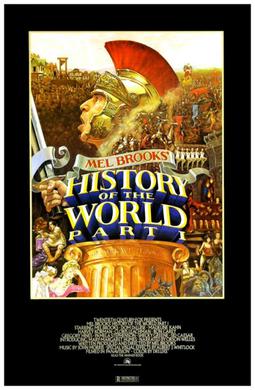
History of the World, Part I
History of the World, Part I is a 1981 American comedy film written, produced, and directed by Mel Brooks. Brooks also stars in the film, playing five roles: Moses, Comicus the stand-up philosopher, Tomás de Torquemada, King Louis XVI, and Jacques, le garçon de pisse. The large ensemble cast also features Sid Caesar, Shecky Greene, Gregory Hines (in his film debut), Charlie Callas; and Brooks regulars Ron Carey, Dom DeLuise, Madeline Kahn, Harvey Korman, Cloris Leachman, Andreas Voutsinas, and Spike Milligan.
For the song, see The History of the World (Part 1).
The film also has cameo appearances by Royce D. Applegate, Bea Arthur, Nigel Hawthorne, Hugh Hefner, John Hurt, Phil Leeds, Barry Levinson, Jackie Mason, Paul Mazursky, Andrew Sachs and Henny Youngman, among others. Orson Welles narrates each story.
Despite carrying the numeration Part I, there were originally no plans for a sequel.[4] The title is a play on The History of the World by Sir Walter Raleigh, which was intended to be published in several volumes but only the first was completed.[5][6] However, four decades later, Hulu announced the limited series History of the World, Part II, which premiered on March 6, 2023.
Release[edit]
Critical reception[edit]
The film holds an approval rating of 63% on Rotten Tomatoes, based on 35 reviews. The site's consensus reads: "History of the World Part 1 may not have enough comedic inspiration to merit a Part 2, but the sporadic cleverness of these anachronistic skits are [sic] still a testament to Mel Brooks' gift of farce".[12] It was nominated for Worst Picture at the 1981 Stinkers Bad Movie Awards but lost to Tarzan, the Ape Man. The revised ballot, released in 2007, removed its Worst Picture nomination and instead nominated it for Most Painfully Unfunny Comedy (which it won). It also garnered a Worst Song nomination at the same ceremony for "The Inquisition" (lost to "Baby Talk" from Paternity).
Roger Ebert gave the film two stars out of four and described it as "a rambling, undisciplined, sometimes embarrassing failure from one of the most gifted comic filmmakers around. What went wrong? Brooks never seems to have a clear idea of the rationale of his movie, so there's no confident narrative impetus to carry it along."[13] Gene Siskel, however, gave it three stars out of four and said that even though the film "borrows heavily from [Brooks'] previous work," it "contains a bunch of solid laughs."[14] Janet Maslin of The New York Times wrote, "There are loads of familiarly funny gags in the film ... But the movie is so sour that its humor is often undermined, because so many of the jokes are either mean-spirited or scatological, or both."[15] Pauline Kael of The New Yorker was positive and wrote, "It's an all-out assault on taste and taboo, and it made me laugh a lot."[16] Variety called it "a disappointingly uneven farce which serves up a fair share of hearty laughs during its first half, but sputters out long before the close."[17] Sheila Benson of the Los Angeles Times wrote, "Presumably everyone was so busy doing shtick and reacting off each other that there was no one left to mind the story and to say, 'Not funny.' Not only not funny, but a big, overblown, crashing bore, fellas."[18] Gary Arnold of The Washington Post called it "an entertaining mishmash of skits which finds Mel Brooks back in lively form, for better and for worse ... To a considerable extent the funny stuff works in a laughing-in-spite-of-yourself way."[19] Leonard Maltin's film guide gave the movie one-and-a-half out of a possible four stars and stated that the gags "range from hilarious to hideous. After a while there's no more momentum, and it all just lies there, despite the efforts of a large comic cast."[20]
Box office[edit]
The film opened in 484 theatres the same weekend as Raiders of the Lost Ark and Clash of the Titans and finished fourth for the weekend with a gross of $4.8 million,[3] behind Raiders, Clash and Cheech and Chong's Nice Dreams.[21] With a per-screen average of $10,000, it was Brooks's highest opening on a per-screen basis.[21] Despite the strong start, poor word of mouth impacted its box office. Although it grossed $31.7 million, it was considered a commercial disappointment because the film had been "tracking" well and Brooks's previous films had been so successful.[22]